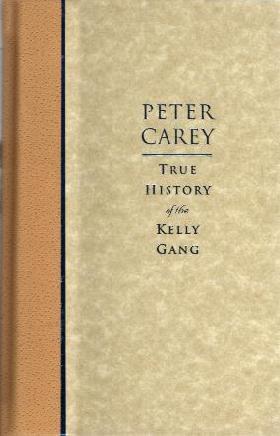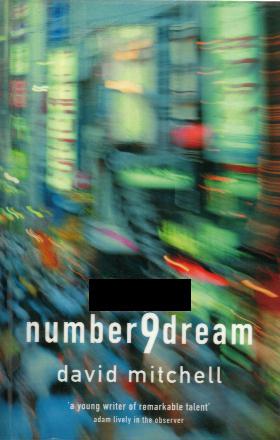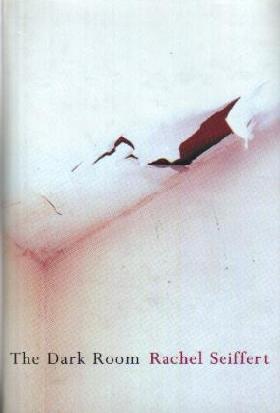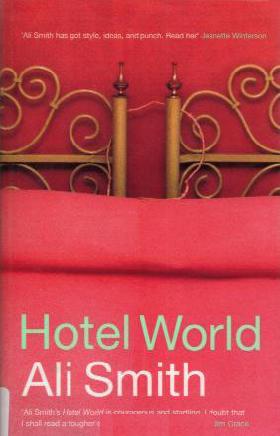
Peter Carey
The following novels constitute the shortlist for the 2001 Booker Prize:
2001 Longlist
Notable Omissions from the 2001 Long/Shortlist

|
True History of the Kelly Gang Peter Carey |
First Paragraph:
By dawn at least half of the members of the Kelly gang were badly wounded and it was then that the creature appeared from behind police lines. It was nothing human, that much was evident. It had no head but a very long thick neck and an immense chest and it walked with a slow ungainly gait directly into the hail of bullets. Shot after shot was fired without effect and the figure continued to advance on the police, stopping every now and then to move its headless neck slowly and mechanically around.
I am the b----y Monitor, my boys.
The police had modern Martini-Henry rifles yet the bullets bounced off the creature's skin. It responded to this attack, sometimes with a pistol shot, but more often by hammering the butt of its revolver against its neck, the blows ringing with the clearness and distinctiveness of a blacksmith's hammer in the morning air.
You shoot children, you f-----g dogs. You can't shoot me.
As the figure moved towards a dip in the ground near to some white dead timber, the police intensified their attack. Still the figure remained erect, continuing the queer hammering on its neck. Now it paused and as its mechanical turret rotated to the left the creature's attention was taken by a small round figure in a tweed hat standing quietly beside a tree. The creature raised its pistol and shot, and the man in the tweed hat cooly kneeled before it. He then raised his shotgun and fired two shots in quick succession.
My legs, you mongrel.
The figure reeled and staggered like a drunken man and in a few moments fell near the dead timber. Moments later a crude steel helmet like a bucket was ripped from the shoulders of a fallen man. It was Ned Kelly, a wild beast bought to bay. He was shivering and ghastly white, his face and hands were smeared with blood, his chest and loins were clad in solid steel-plate armour one quarter of an inch thick.
Meanwhile the man responsible for this event had drawn his curtains and was affecting to have no interest in either the gunshots or the cries of the wounded.
At dark a party of police escorted him and his wife directly from his cottage to the Special Train and so he neither witnessed nor took part in the wholesale souveniring of armour and guns and hair and cartridges that occurred at Glenrowan on June 28th 1880. And yet this man also had a keepsake of the Kelly Outrage, and on the evening of the 28th, thirteen parcels of stained and dog-eared papers, every one of them in Ned Kelly's distinctive hand, were transported to Melbourne inside a metal trunk.
Undated, unsigned, handwritten account in the collection of the Melbourne Public Library. (V.L. 10453)
From the UQP hardback edition, 2000.
Note:
Further details of this, and other novels by Peter Carey, can be found at this
webpage.

|
Atonement Ian McEwan |
Dustjacket synopsis:
"On the hottest day of the summer of 1934, thirteen-year-old Briony Tallis sees her sister cecilia strip off her clothes and plunge into the fountain in the garden of their country house. Watching her is Robbie Turner, her childhood friend who, like Cecilia, has recently come down from Cambridge.
"By the end of that day the lives of all three will have been changed for ever. Robbie and Cecilia will have crossed a boundary they had not even imagined at its start, and will have become victims of the younger girl's imagination. Briony will have witnessed mysteries, and committed a crime for which she will spend the rest of her life trying to atone."
Quotes:
"A beautiful and majestic fictional panorama" - John Updike
"Subtle as well as powerful, adeptly encompassing comedy as well as atrocity, Atonement is a richly intricate
book...A superb achievement" - Sunday Times
"He is this country's unrivalled literary giant...a fascinatingly strange, unique and gripping novel" - Independent on Sunday
"The best thing he has ever written" - Observer
"McEwan's best novel so far, his masterpiece" - Evening Standard
First Paragraph:
The play - for which Briony had designed the posters, programmes and tickets, constructed the sales booth out of a folding screen tipped on its side, and lined the collection box in red crępe paper - was written by her in a two-day tempest of composition, causing her to miss a breakfast and a lunch. When the preparations were complete, she had nothing to do but contemplate her finished draft and wait for the appearance of her cousins from the distant north. There would be time for only one day of rehearsal before her brother arrived. At some moments chilling, at others desperately sad, the play told a tale of the heart whose message, conveyed in a rhyming prologue, was that love which did not build a foundation on good sense was doomed. The reckless passion of the heroine, Arabella, for a wicked foreign count is punished by ill fortune when she contracts cholera during an impetuous dash towards a seaside town with her intended. Deserted by him and nearly everybody else, bed-bound in a garret, she discovers in herself a sense of humour. Fortune presents her a second chance in the form of an impoverished doctor - in fact, a prince in disguise who has elected to work among the needy. Healed by him, Arabella chooses judiciously this time, and is rewarded by reconciliation with her family and a wedding with the medical prince on 'a windy sunlit day in spring'.
From the Vintage paperback edition, 2002.

|
Oxygen Andrew Miller |
Dustjacket synopsis:
"It is the summer of 1997. The year of the comet. Alec Valentine returns to the West Country house of his childhood to care for his gravely ill mother, Alice - a task that reinforces his deep sense of inadequacy. In San Francisco, his older brother Larry prepares to visit too, while knowing it will be hard to conceal that his acting career is sliding towards sleaze and his marriage is faltering.
"By contrast László Lázár, the Hungarian exile whose play Alec is translating, seems to have it all - a comfortable home in Paris, critical acclaim, a loving boyfriend, a circle of close friends. Yet László cannot shake off his memories of the 1956 uprising, and the cry for help he left unanswered.
"For all four, the moment has come to assess the turnings taken and the opportunities foregone, the achievements and the failures, the point of it all. And each will soon face a new challenge, each take part in an act of liberation - though not necessarily the foreseen one.
"In this beautifully wrought, involving and immensely thought-provoking novel, Andrew Miller's characters grapple with the essentials of sex, death, love, and morality in search of happiness and the answer to the all important question: what is the true currency of human success?"
First Paragraph:
The Dream Catcher, an artifact made on the reservations of Native Americans and sold in the souvenir shops there for little money, was a circle the size of a man's palm, formed from some pliant wood and then banded with a leather thong. Across the centre of the circle was a weave of plastic thread like a spider's web, and at the heart, like the spider itself, a single green bead. Larry Valentine had bought one for his daughter Ella at a place called the Indian Bear Meat Den while filming in North Carolina on what turned out to be one of his last shows with Sun Valley General. It hung now at the window of her bedroom where, according to the explanatory leaflet, it would snag the bad dreams in its web, while the good ones, dreams of cloudless mornings, of days out at Muir beach, of friendly doctors and loving fathers, would reach the bed where she slept.
He gazed down at her, feeling enormous in this room of little things. She had a single cotton sheet over her and lay beneath it in a hot sprawl, her mouth partly open, pulling the summer-night air in a hiss over her tongue. Wisps of hair were scattered like cuttings around her face, and her eyes were shut tight as though sleep were something to be concentrated on, like colouring and not going over the black lines, or the sums she did with an unwieldy pencil in her school book.
From the Sceptre hardback edition, 2001.

|
number9dream David Mitchell |
Dustjacket synopsis:
"The days of summer are numbered. As Eiji Miyake's twentieth birthday nears, he arrives in Tokyo with a mission - to
find the father he has never met.
"number9dream follows Eiji on a search that leads through the seething city's underworld, its lost property offices and video arcades; through his own imaginings, dreams and memories; via his alcoholic mother's letters, the manuscript of an attic fabulist, and the journal of a wartime human torpedo pilot; to encounters with a syndicate of organ harvesters, John Lennon, and the god of thunder; and finally back to the rainy southern island of Yakushima, where everything that matters to Eiji began and ended.
"David Mitchell's second novel belongs in a Far Eastern, multi-textual, urban-pastoral, road-movie-of-the-mind, cyber-metaphysical, detective/family chronicle, coming-of-age-love-story genre of one. It is a mesmerising successor to his highly acclaimed and prize-winning debut, Ghostwritten."
First Paragraph:
'It is a simple matter. I know your name, and you knew mine, once upon a time: Eiji Miyake. Yes, that Eiji Miyake. We are both busy people, Ms Katô, so why not cut the small talk? I am in Tokyo to find my father. You know his name and you know his address. And you are going to give me both. Right now.' Or something like that. A galaxy of cream unribbons in my coffee cup, and the background chatter pulls into focus. My first morning in Tokyo, and I am already getting ahead of myself. The Jupiter Café sloshes with lunch-hour laughter, Friday plottings, clinking saucers. Drones bark into mobile phones. She-drones hitch up sagging voices to sound more feminine. Coffee, seafood sandwiches, detergent, steam. I have an across-the-street view of the PanOpticon's main entrance. Quite a sight, this zirconium gothic skyscraper. Its upper floors are hidden by clouds. Under its tight-fitting lid Tokyo steams - 34'C with 86% humidity. A big Panasonic display says so. Tokyo is so close up you cannot always see it. No distances. Everything is over your head - dentists, kindergartens, dance studios. Even the roads and walkways are up on murky stilts. Venice with the water drained away. Reflected airplanes climb over mirrored buildings. I always thought Kagoshima was huge, but you could lose it down a side alley in Shinjuku. I light a cigarette - Kool, the brand chosen by a biker ahead of me in the queue - and watch the traffic and passers-by on the intersection between Ômekaidô Avenue and Kita Street. Pin-striped drones, a lip-pierced hairdresser, midday drunks, child-laden housewives. Not a single person is standing still. Rivers, snowstorms, traffic, bytes, generations, a thousand faces per minute. Yakushima is a thousand minutes per face. All of these people with their boxes of memories labelled 'Parents'. Good shots, bad shots, frightening figures, tender pictures, fuzzy angles, scratched negatives - it doesn't matter, they know who ushered them on to Earth. Akiko Katô, I am waiting. Jupiter Café is the nearest lunch place to PanOpticon. It would be so much simpler if you would just drop by here for a sandwich and a coffee. I will recognize you, introduce myself, and persuade you that natural justice is on my side. How do daydreams translate into reality? I sigh. Not very well, not every often. I will have to storm your fortress in order to get what I want. Not good. A building as huge as the PanOpticon probably has other exits, and its own restaurants. You are probably an empress by now with slaves to fetch your meals. Who says you even eat lunch? Maybe a human heart for breakfast tides you over until suppertime. I entomb my Kool in the remains of its ancestors, and resolve to end my stake-out when I finish this coffee. I'm coming in to get you, Akiko Katô. Three waitresses staff Jupiter Café. One - the boss - is as brittle as an imperial dowager who poisoned her husband with misery, one has a braying donkey voice, and the third is turned away from me, but she has the most perfect neck in all creation. Dowager is telling Donkey about her hairdresser's latest failed marriage. 'When his wife falls to measure up to his fantasies, he throws her overboard.' The waitress with the perfect neck is serving a life sentence at the sink. Are Dowager and Donkey cold-shouldering her, or is she cold-shouldering them? Level by level, the PanOpticon disappears - the clouds are down to the eighteenth floor. The fog descends farther when I look away. I calculate the number of days I have been alive on a paper serviette - 7,290, including four leap years. The clock says five to one, and the drones drain away from Jupiter Café. I guess they are afraid they'll get restructured if one o'clock finds them anywhere but their striplit cubicles. My coffee cup stands empty in a moat of slops. Right. When the hour hand touches one, I'm going into the PanOpticon. I admit I'm nervous. Nervous is cool. A recruitment officer for the Self-Defence Forces came to my high school last year, and said that no fighting unit wants people who are immune to fear - soldiers who don't feel fear get their platoon killed in the firts five minutes on the battlefield. A good soldier controls and uses his fear to sharpen his senses. One more coffee? No. One more Kool, to sharpen my senses.
From the Hodder & Stoughton paperback edition, 2001.

|
The Dark Room Rachel Seiffert |
Dustjacket synopsis:
"Each of us is an individual; each of us has an individual responsibility for our own actions. Each of us is also a
member of a family, of families, each of us is a citizen of a state, a member of a nation. Can we, must we, take
responsibility for them, for their actions too?
"Perhaps in no other country in twentieth-century Europe have such questions had as much resonance as they had in Germany. What has it meant to be German in the twentieth century? What has it meant to be the child of German parents, the daughter of members of the Nazi party, the grandson of a grandfather who was in the Waffen SS, the father of a German child?
"The Dark Room tells the stories of three ordinary twentieth-century Germans: Helmut, a young photographer in Berlin in the 1930s who uses his craft to express his patriotic fervour; Lore, a twelve-year-old girl who in 1945 guides her young siblings across Germany after her Nazi parents are seized by the Allies; and, half a century later, Micha, a young teacher obsessed with what his grandfather did in the war, struggling to deal with the past of his family and his country.
"An immensely thoughtful, quietly powerful and affecting examination of ordinary lives and ordinary families facing the impact of extraordinary and terrible times, The Dark Room is a truly remarkable work of fiction."
First Paragraph:
Berlin, April 1921
Birth. His mother cuddles him and cradles him, and feeds him his first meal. Happy to hold this life she has felt within her all these months. He is a little premature, but not too small, and his miniature fists grip fast to her fingers. She knows him already, and loves him. The mid-wife takes her husband aside when he arrives home from work. Heads him off before he reaches the bedroom door. Unlike his wife, he never gets to look at his son and feel him perfect: to love him prior to knowing his fault.
The clinic is busy, the doctor brisk but sympathetic, recommended by the midwife. The new parents are told it is a congenital condition, but not serious. Put simply, their son is missing a muscle in his chest. Provided he is given regular physiotherapy he will certainly be able to write, and do all the tasks required in everyday life. He will never have full use of his right arm, of course, and manual labour will be impossible, but the absence of a pectoral muscle need not be a significant hindrance. He might even be able to play sport in time, though they are not to raise their hopes too high.
At home they watch their baby closely while he gurgles and kicks in his drawer-for-a-cot. His curved limbs and long toes, creases of new skin. He is beautiful, and the new parents smile at each other, each ready to laugh if the other will. They remove their son's little vest and inspect his chest and his right armpit as he moves. He is thinner on one side than the other, it is true. But both arms pump just as vigorously when he is fed or tickled, and he is robust and lively.
From the William Heinemann hardback edition, 2001.

|
Hotel World Ali Smith |
Dustjacket synopsis:
"Remember you must live.
"Five people: four are living, three are strangers, two are sisters, one is dead.
"Hotel World takes us through a night in thelife of five people's very different worlds. It's luxurious for some, but a long drop for others. Cash or credit?
"Ali Smith's innovative and extraordinary new novel checks us in to the smooth plush world of the Global. But is it really the kind of place you want to spend the rest of your life in?
Playful, defiant, richly inventive, Hotel World is a riotous elegy, a deadpan celebration, an alchemy of opposite worlds colliding to make a modern parable of connection an indifference, and in the end a defence of love."
Quotes:
"Ali Smith has got style, ideas, and punch. Read her." - Jeanette Winterson
"For anyone who has ever stayed in a hotel, worked in a hotel, longed to check in to a hotel, this book is a must.
An unsettling and disturbing novel, it is often also wildly funny. Hotel World shows the strange and tiny ways
we all connect in a rich read that resonates long after you put it down. Ali Smith's prose sizzles and sparks with
energy and life. She is a writer who is not afraid to grasp and gold ideas and who has a totally original eye for the
smallest detail. Her bok is a haunting, mesmerizing story of five women in one hotel." - Jackie Kay
First Paragraph:
Woooooooo-
hooooooo what a fall what a soar what a plummet what a dash into dark into light what a plunge what a glide thud crash what a drop what a rush what a swoop what a fright what a mad hushed skirl what a smash mush mash-up broke and gashed what a heart in my mouth what an end.
What a life.
What a time.
What I felt. Then. Gone.
Here's the story; it starts at the end. It was the height of the summer when I fell; the leaves were on the trees. Now it's the deep of the winter (the leaves fell off long ago) and this is it, my last night, and tonight what I want more than anything in the world is to have a stone in my shoe. To be walking along the pavement here outside the hotel and to feel a stone rattling about in my shoe as I walk, a small sharp stone, so that it jags into different parts of the sole and hurts just enough to be pleasure, like scratching an itch. Imagine an itch. Imagine a foot, and a pavement beneath it, and a stone, and pressing the stone with my whole weight hard into the skin of the sole, or against the bones of the bigger toes, or the smaller toes, or the inside curve of the foot, or the heel, or the small ball of muscle that keeps a body upright and balanced and moving across the breathtaking still-hard surface of the world.
From the Hamish hamilton paperback edition, 2001.
According to Queeney, Beryl Bainbridge
If the Invader Comes, Derek Beaven
A Son of War, Melvyn Bragg
Shamrock Tea, Ciaran Carson
The Element of Water, Stevie Davies
The Pickup, Nadine Gordimer
Dogside Story, Patricia Grace
By the Sea, Abdulrazak Gurnah
How to be Good, Nick Hornby
Wolfy and the Strudelbakers, Zvi Jagendorf
Translated Accounts, James Kelman
The Blue Tango, Eoin McNamee
Fairness, Ferdinand Mount
Half a Life, V. S. Naipaul
The Amber Spyglass, Philip Pullman
The Death of Vishnu, Manil Suri
The Stone Carvers, Jane Urquhart
The Leto Bundle, Marina Warner
You can read further details about each of these novels on the 2001 Booker longlist page.
This page and its contents are copyright © 2001-05 by Perry Middlemiss, Melbourne, Victoria, Australia.
Last modified: October 17, 2005.